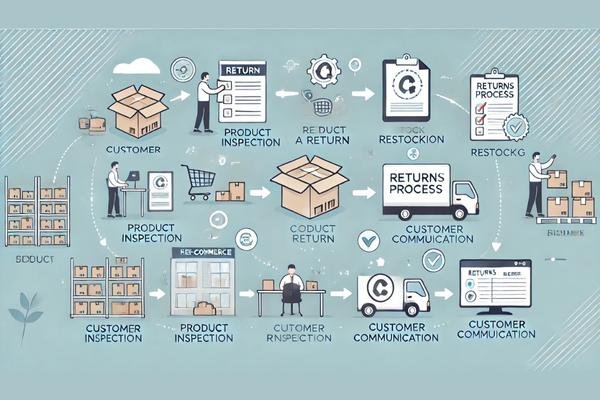
Top Tools for Analyzing the Performance of Your Loyalty Programs
October 2, 2024
How to Choose the Best Online Store Platform for E-Commerce
October 2, 2024Top Online Store Platforms for Your Business Needs
In the digital age, choosing the right online store platform is one of the most crucial decisions for any e-commerce business. Whether you’re a small startup or a growing enterprise, the platform you select will influence your website’s functionality, customer experience, and overall success. In this article, we’ll explore the best e-commerce platforms available, addressing the needs of digital marketing professionals, developers, and content creators. We’ll also provide insights into what to consider when selecting an online store platform.
Table of Contents
1. Why Choosing the Right Online Store Platform Matters
The main keyword, “online store platforms,” plays a key role in determining the success of your e-commerce business. Selecting the right platform can streamline your operations, improve your website’s SEO, and enhance user experience. Whether you’re focusing on scalability, customization, or ease of use, there’s a platform that suits your specific business needs.
Key Considerations When Choosing an Online Store Platform:
- Ease of Use: The platform should be user-friendly for both developers and non-technical staff.
- Customization: Flexibility in design and features.
- Scalability: The ability to grow with your business.
- SEO and Marketing Tools: Built-in SEO features to improve search engine visibility.
- Integration with Third-Party Apps: Compatibility with other tools and systems.
Now, let’s dive into the top e-commerce platforms available today.
2. Top Online Store Platforms
2.1 Shopify
Overview:
Shopify is one of the most popular online store platforms, particularly known for its simplicity and ease of use. It’s an all-in-one solution that allows businesses to set up an online store quickly, without needing extensive technical skills. Shopify offers over 70 customizable themes, a wide range of apps, and strong support for mobile commerce.
Features:
- Built-in Payment Gateway: Shopify Payments simplifies transactions.
- SEO-friendly: Built-in tools help optimize your site for search engines.
- Mobile Optimization: All themes are responsive, ensuring a smooth mobile shopping experience.
- App Store: Access to thousands of apps to enhance your store’s functionality.
Pros:
- Easy to set up, making it ideal for beginners.
- Great customer support.
- Secure and reliable.
Cons:
- Limited customization for developers.
- Transaction fees unless you use Shopify Payments.
2.2 WooCommerce
Overview:
WooCommerce is an open-source platform designed for WordPress websites. It’s perfect for businesses looking for full control over their store’s customization and functionality. WooCommerce is highly scalable, with thousands of plugins and extensions to meet your specific needs.
Features:
- Customizable: Full access to modify the source code.
- SEO Friendly: WooCommerce runs on WordPress, which is widely regarded as one of the most SEO-friendly platforms.
- Wide Range of Extensions: From payment gateways to marketing tools, you can add virtually any functionality.
- Community Support: A large community of developers and users offers extensive support and resources.
Pros:
- Free to use (with paid extensions available).
- Highly flexible and customizable.
- Strong SEO features through WordPress.
Cons:
- Requires more technical knowledge to set up and maintain.
- Hosting and domain costs are separate.
2.3 BigCommerce
Overview:
BigCommerce is known for its scalability, making it an ideal solution for growing businesses. It provides a robust, feature-rich platform with advanced tools for SEO, analytics, and marketing automation.
Features:
- Multi-channel Selling: Sell on platforms like Amazon, eBay, and Facebook directly from BigCommerce.
- SEO Tools: Advanced SEO features like optimized URLs, metadata, and sitemaps.
- Built-in Analytics: Gain insights into customer behavior, product performance, and conversion rates.
- Customizable Themes: Beautiful, responsive themes that are easy to customize.
Pros:
- No transaction fees, even when using third-party payment gateways.
- Built-in marketing features.
- Great scalability for larger businesses.
Cons:
- The learning curve can be steep for beginners.
- Higher cost compared to other platforms.
2.4 Magento
Overview:
Magento, now part of Adobe, is a powerful open-source e-commerce platform that offers advanced customization and scalability. It’s best suited for larger businesses with access to development resources. Magento can handle high volumes of traffic and transactions, making it a favorite for enterprise-level companies.
Features:
- Unlimited Customization: Full access to the platform’s source code.
- Scalability: Ideal for businesses with large catalogs and high transaction volumes.
- SEO Optimization: SEO-friendly architecture with customizable URLs, metadata, and sitemaps.
- Extensions Marketplace: Thousands of extensions available for customization.
Pros:
- Highly scalable and flexible.
- Advanced SEO features.
- Supports complex, large-scale operations.
Cons:
- Requires a skilled developer for setup and maintenance.
- Higher operational costs.
2.5 Wix eCommerce
Overview:
Wix is a drag-and-drop website builder that has recently expanded its offerings to include e-commerce functionality. It’s a good choice for smaller businesses and solopreneurs looking for an easy-to-use platform with basic e-commerce capabilities.
Features:
- Drag-and-Drop Builder: No coding required, making it extremely user-friendly.
- App Market: Access to various apps to enhance store functionality.
- Mobile Optimization: Ensures your store looks great on mobile devices.
- SEO Tools: Built-in features to help improve your site’s search rankings.
Pros:
- Extremely easy to use.
- All-in-one solution with hosting included.
- Affordable pricing plans.
Cons:
- Limited scalability for larger businesses.
- Fewer customization options compared to platforms like WooCommerce or Magento.
3. Factors to Consider When Choosing an Online Store Platform
While each e-commerce platform offers its own set of benefits, choosing the best one for your business requires careful consideration of several factors:
3.1 Business Size and Growth Potential
- Startups and Small Businesses: If you’re just starting, platforms like Shopify or Wix are ideal due to their ease of use.
- Medium-Sized Businesses: BigCommerce and WooCommerce provide more advanced features and customization options, making them better suited for growing companies.
- Enterprise-Level Businesses: For businesses with larger product catalogs and higher transaction volumes, Magento offers the scalability and customization needed.
3.2 Customization Needs
- Minimal Customization: Shopify and Wix are great for those who want a quick setup with minimal customization.
- Advanced Customization: WooCommerce and Magento allow for full control over design and functionality, ideal for developers who need flexibility.
3.3 SEO and Marketing Tools
Ensure the platform offers built-in SEO tools to improve your search rankings. WordPress-based platforms like WooCommerce excel in SEO capabilities, while BigCommerce and Shopify also offer solid options for SEO optimization.
3.4 Ease of Integration
Your platform should easily integrate with third-party tools like email marketing software, analytics tools, and inventory management systems. Most platforms support integrations, but some like Magento require more technical know-how.
Top Online Store Platforms for Your Business Needs Comparaison
Top Online Store Platforms for Your Business
| Platform | Best For | Key Features | Pros | Cons | Link |
|---|---|---|---|---|---|
| Shopify | Small to medium-sized businesses |
– Built-in payment gateway – SEO-friendly – Mobile-optimized themes |
– Easy setup – Secure and reliable – Extensive app store |
– Limited customization – Transaction fees unless using Shopify Payments | Visit Shopify |
| WooCommerce | Businesses using WordPress |
– Open-source and customizable – Strong SEO features – Large plugin library |
– Free to use – Highly flexible – Great for SEO |
– Requires technical knowledge – Hosting and domain costs are separate | Visit WooCommerce |
| BigCommerce | Scaling businesses |
– Multi-channel selling – Advanced SEO tools – Built-in analytics |
– No transaction fees – Robust marketing tools – Highly scalable |
– Higher cost – Steeper learning curve | Visit BigCommerce |
| Magento | Large enterprises |
– Highly scalable – Advanced customization – Extensive extensions marketplace |
– Supports complex operations – Powerful SEO tools – Unlimited customization |
– Requires developer expertise – High operational costs | Visit Magento |
| Wix eCommerce | Small businesses and solopreneurs |
– Drag-and-drop builder – Mobile-optimized – Affordable pricing |
– Extremely user-friendly – Beautiful templates – All-in-one solution |
– Limited scalability – Fewer advanced features | Visit Wix |
4. Frequently Asked Questions
Which e-commerce platform is best for beginners?
For beginners, Shopify and Wix are the best options due to their simplicity, intuitive interfaces, and affordable pricing plans.
What is the most customizable e-commerce platform?
WooCommerce and Magento offer the highest level of customization. Both platforms allow access to the source code, enabling developers to build a fully tailored store.
Can I migrate my store from one platform to another?
Yes, most platforms allow for migration, but the process can vary in complexity. Tools like Cart2Cart or built-in migration options from platforms like BigCommerce can help with this process.
Conclusion
Choosing the right online store platform is critical for the success of your e-commerce business. Each platform offers a unique set of features, so it’s important to select one that aligns with your business goals, technical expertise, and scalability needs. Whether you’re looking for simplicity with Shopify, customization with WooCommerce, or enterprise-level power with Magento, there’s a solution for every business type. By understanding the strengths and weaknesses of each platform, you can make an informed decision that sets your online store up for long-term success.








